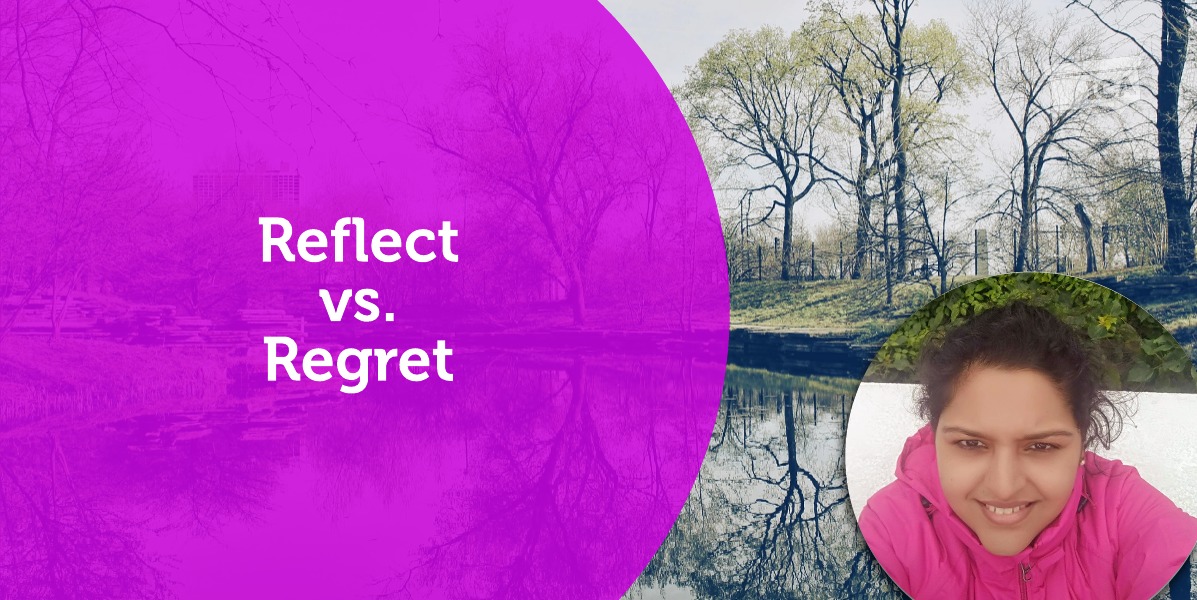A Coaching Power Tool Created by Richa Arvind
(Career Transformation Coach, TAIWAN)
The Oxford dictionary describes Regret as “a feeling of sadness, repentance, or disappointment over an occurrence or something that one has done or failed to do”
In my coaching experiences, I have very commonly come across situations, when the coachee starts self-reflecting on their experiences, and more often than not they always regret a situation in their life which appears to be the trigger to their current state of mind. They always seem to be surrounded by the fears that overwhelm them and come in the way of their ability to move on in life.
Regret is a very heavy feeling which tends to drown us in the past and triggers a whirlpool of negative behaviors or feelings towards oneself and people/situations around us. When we are always driven by guilt, our natural tendency is to stop focusing on a healthy analysis of what happened and how it could have been different, to absolutely blaming oneself or others for those situations. This directly impacts us by putting either ourselves or others down for an action of the past in the present. The inability to leave the past regrets puts us into a constant loop of fear, a lack of confidence, and deters our decision-making abilities.
The constant worry and inability to enjoy the here and now always impact the situations and people around us. Being in a state of constant regret makes us worry about the future and more so on how to undo the mistakes/issues of the past. The feeling of always looking at things in a black and white emerges much from this behavior of regretting things and not just picking up from them and moving ahead in life. Interestingly, we get so involved in dealing with the regret that many times we develop self-destroying feelings which impede us from recognizing any kind of positive outcomes or learnings we might have developed during the process/time frame and we fail to acknowledge any kind of achievements.
Accept Your Past without Regret, Handle Your Present with Confidence & Face Your Future without Fear.
Shift Your Focus From RE(gret) To RE(flect)
This is the time to bring in Reflect. Think about your past, yes, definitely! But not to brood and regret it, but to pause, think, reflect, accept & learn from it. Analyzing the past, observing ourselves, and learning from whatever happened can help us deconstruct the vicious circle of regret and break away from it. This not only makes us learn more about different situations & people but also about ourselves and our reactions and responses to different situations. When we learn to accept the past, we tend to develop a healthy habit of acknowledging, thanking, complementing, and valuing what we have and what we do. Using objectivity and rational thinking in similar situations, we also gain the strength to guide or mentor people if they face similar issues. We arrive at a situation where we stop weighing things in black and white and instead start believing that life can have many shades of grey depending on the situation. Even better, we start looking at life as a rainbow full of different colors depicting our learnings and achievements.
Our ability to move away from regret and start looking at it as experiences & learnings help us make decisions and actions towards a better present & brighter future. What more? We start seeing a less judgmental version of ourselves & others and start enjoying the present, thus learning to live in the now than in the past or future.
Mindfulness Helps in Reflecting more than Regretting
When in regret mode, we are constantly in a state of self-judgment & defensiveness. Trying to find reasons to justify whatever actions happened in the past can be a very stressful and overwhelming emotion. When we are judgmental, we are playing defense. Being mindful of your past, looking at those experiences as lessons for life is what helps us grow, empowers us towards better actions, and builds a sense of trust towards self and others. When we learn to be mindful and reflect on our past, we become more open-minded, accepting and thus have the attitude to learn the situation, the behavior, and the reason why something happened the way it did.
Coaching Application
During coaching sessions, coaches can use active listening, powerful questioning & reframing perspectives to work with their coachees in reflecting, taking action, and moving from negative regretful mode to a more positive reflective mode.
Creating an environment of Trust vs. Doubt helps coachees release their fears and feelings of insignificance not just during the coaching session but also in their life and their interactions with others. The ability to coach them towards responding by taking time to observe, learn and understand instead of just reacting can go a long way towards developing self-trust and also belief in the support systems and the environment they operate in.
To Conclude
Regret should be looked at as a call to reflection. It creates the need for us to reflect upon our life, our situation, and the actions we take as an outcome of that. We can learn to think & act responsibly if we apply mindfulness and step back to reflect on our situation and the related learnings. Learning to accept the past as is and engaging in positive conversations with ourselves can take us very far in achieving deeper purpose to what and why we do certain things.
Some questions to support your client with reflecting on their past
Regrets only apply when we don’t learn from a situation. No sense looking back, look forward with new knowledge and no regret. – Catherine Pulsifer
References:
https://themeaningmovement.com/
